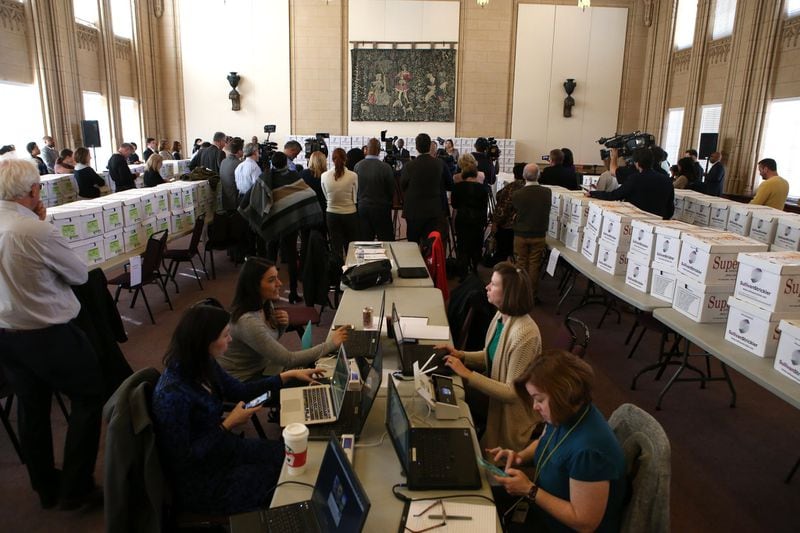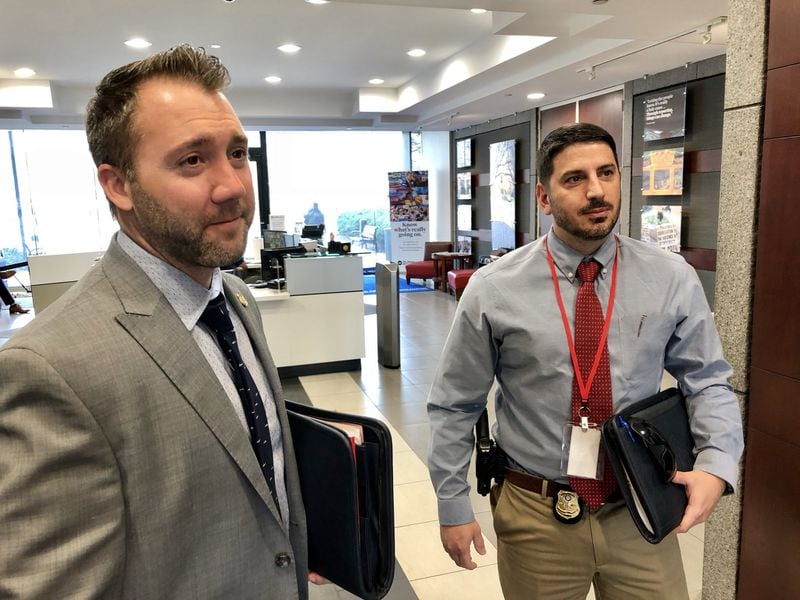The Reed administration’s decision to withhold a grand jury subpoena last year may have violated Georgia’s open records laws, experts told The Atlanta Journal-Constitution.
The Sept. 9, 2016, subpoena, obtained last week by the AJC and Channel 2 Action News, should have been promptly released in response to an open records request in January of last year that sought all federal subpoenas received by the city over the prior 18 months, the experts said.
“The law department should have those records at their fingertips,” said Gerry Weber, an expert in constitutional and open records law.
In February 2017, the city turned over a subpoena it received pertaining to former City Hall official Mitzi Bickers, issued in August 2016, and one pertaining to contractors Elvin "E.R." Mitchell Jr. and Charles P. Richards Jr., issued in November 2016.
But the September 2016 subpoena remained secret until now and records responsive to it have not been released to the public on a city online repository established in the wake of the corruption scandal.
“Certainly, absolutely this is another violation of the Georgia Open Records Act,” said Greg Lisby, a Georgia State University communication professor who teaches communication law.
Reed: Records ‘unrelated’ to investigation
The AJC and Channel 2 learned of the September 2016 subpoena from a tip and requested it under the open records act this month. It is the second of at least eight known federal grand jury subpoenas delivered to City Hall in connection to the corruption investigation. In the cases of all other known subpoenas, the city released the subpoenas within a few days or weeks of a request by the media.
News of the previously unknown subpoena also comes as the Georgia Bureau of Investigation is conducting a criminal probe of potential open records violations by former members of Reed's communications staff and the city's law department.
State law mandates that government officials provide responsive documents within three business days of a request if they are available. Obstructing or “frustrating” the release of documents is explicitly prohibited and punishable as a misdemeanor.
The open records act also requires agencies and public officials to cite the legal exemptions for withholding or redacting any document related to a request. The city offered no such explanation for the withheld subpoena.
In separate statements, Reed and then-City Attorney Cathy Hampton said the city delayed production of the subpoena upon the advice of outside legal counsel, whom they refused to identify.
Reed said the records requested by the feds were about “personnel decisions” related to former airport general manager Miguel Southwell and Watershed Commissioner Jo Ann Macrina and “were unrelated to the ongoing federal bribery investigation.”
But federal grand juries investigate potential crimes, not personnel matters.
Through a spokesman, Reed said he did not intend to circumvent state sunshine laws and acted “in full compliance with state and federal law.”
“The city’s decision to delay producing the subpoena was done with the advice of external and internal counsel with extensive expertise in that area of the law and our decision complied with the law,” Reed said.
Separately, Hampton said the city was advised by outside lawyers that “document production requested by its federal partners should be completed before disseminating a subpoena to the public” to protect the integrity of investigation “while balancing the need for transparency and public trust.”
MORE COVERAGE: THE ATLANTA CITY HALL INVESTIGATION
When asked by the AJC to cite specific exemptions that allowed the city to withhold the subpoena, Hampton said that information fell under attorney-client privilege.
Asked why the September 2016 subpoena was not supplied then when subpoenas for Bickers and Mitchell-Richards were, Hampton said “the two other tranches of responsive documents had been delivered and subsequently posted on a designated portal for the public’s review.”
“The September document collection was ongoing and had not been completed,” she said.
But on Monday, a spokesman for Mayor Keisha Lance Bottoms said records production related to the Bickers, Mitchell and Richards subpoenas also remains ongoing, contradicting Hampton’s explanation.
Bottoms’ spokesman also said the city’s new legal team made the decision to release the September 2016 subpoena in the interests of “this administration’s commitment to transparency.”
State and feds probe city
In January 2017, the feds unveiled the bribery investigation when it first made public charges against Mitchell. Journalists at the AJC, Channel 2 and other outlets requested documents related to Mitchell’s business with the city.
That month, Channel 2 submitted a request for all federal subpoenas received by the city for the preceding 18 months.
The city initially stonewalled requests, citing the federal probe. Legal experts told the AJC at the time the city was likely violating state open records law.
Then in February, after the AJC and Channel 2 threatened to sue, Reed held a press conference where he unveiled hundreds of boxes he said contained more than 1.4 million pages of records the city said pertained to Bickers, Mitchell and Richards, including the federal subpoenas for their records.
In April of this year, the AJC and Channel 2 filed a complaint with state Attorney General Chris Carr's office alleging "a culture of political interference" with open records requests at City Hall dating back to 2016.
Separately, the GBI is investigating Reed's two top spokeswomen who tried to delay production of water billing records and the employment contract of a senior city official. The state also is investigating the city's law department, which provided purported legal invoices to the AJC that weren't genuine public records.
Reed, meanwhile, was linked to a potential open records violation in March of last year when Jenna Garland, his former press secretary, told a watershed staffer "no action" was needed on a separate open records request. That staffer, Lillian Govus, said she understood the message as a direction from the mayor's office not to comply with the request.
Reed has denied any wrongdoing.
About the Author








